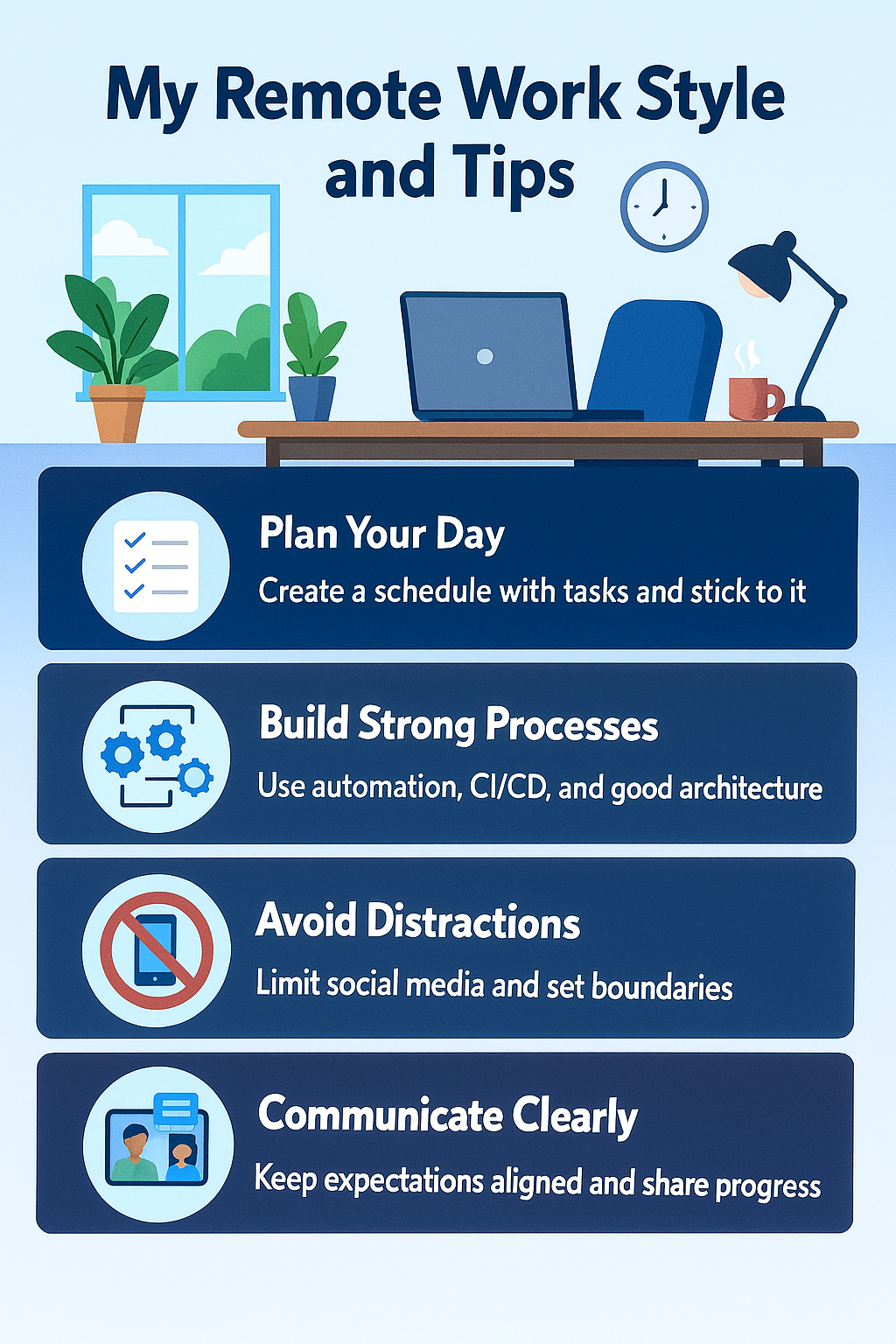My work style and remote work lessons especially for remote-based teams
Over the past few years, I have worked remotely with teams across different time zones such as from Nairobi to Australia, Italy, and sometimes even late into the U.S. hours. Through this, I have learned that remote work success goes far beyond having a laptop and good Wi-Fi.
It’s about discipline, trust, and consistent communication.

Many developers dream of landing a remote job. But without understanding what remote work truly demands, it’s easy to fall short and even damage your professional reputation.
“All I have in this world is my word, and I don’t break it for anyone.” by Scarface
If you’ve ever asked yourself, “How can I stay productive and consistent while working from home?” then, this article is for you.
Plan and create a checklist
One of the biggest productivity killers in remote work is waking up without a plan. Avoid this by planning your day or week in advance, just like we had school timetables back in the day. Back then, teachers had a fixed schedule to ensure every subject was covered. Now it’s your job to create that structure for yourself.
Example of a checklist:
-
Study Design Patterns in Swift/iOS – 2 hours
-
Work on Feature X – 3 hours
-
Review or test code – 1 hour
I normally use the Pomodoro technique to stay focused. For example I set: 40 minutes of deep work, then take 5 minutes of rest (walk around the house, stretch, or do pull-ups, etc) and that’s 1 tomato/pomodoro for me. And during deep work, try as much as you can to avoid social media completely. It’s your biggest productivity trap. Another reason why I recommend you use Command + U instead of Command + R on Xcode, waiting for the simulator to boot then navigate to a given screen for a feedback when implementing a feature.
Build systems that works for you not against you
To work effectively in remote teams, create a process that ensures continuous delivery and visibility. For example:
-
Automation: Have a reliable suite of automated tests. They will help you catch issues early.
-
Continuous Integration: A trustworthy suite of tests will enable you have a good continuous integration where you and your peer can work in isolation and integrate your work constantly.
-
Continuous Delivery: A good continuous delivery pipeline will ensure that your work is delivered several times a day to business, customers, peers thus get constant feedback and iterate much faster.
-
Architecture: Having a good architecture will ensure features are implemented in isolation without stepping on each other’s toes. So keep your app modular so that your peer can build features independently.
-
Communication: Overcommunicate. Always keep expectations aligned and your progress visible. This will help you a lot since your boss is unable to micro manage you as he/she is not seeing you typing code in the office, their anxiety grows each day. To help you control that anxiety with your team, peers, clients, customers, or your boss, you need to over communicate, have a checklist of things you’re working on, things you have worked on and make your work is visible as much as possible all the time.
Note: Remember your boss can’t see you working from home, which naturally builds anxiety. Combat that by showing progress: share what you’re working on, what’s done, and what’s next. Transparency builds trust.
The advantages of working from home
-
Freedom and Balance: You can plan your day around what matters most for example family, hobbies, and health. Personally, I have enjoyed working from the beach, doing deep-sea fishing, scuba diving, playing beach soccer, or snorkeling during the day, and working in the evenings due to time-zone overlaps.
-
Productivity: No random office interruptions or gossip such as office politics, unwanted meetings, talking about soccer etc. You stay focused.
-
No Commute: You save time and money. No loud music on buses or long traffic jams.
-
Location Flexibility: You can live anywhere, even in a peaceful, affordable place surrounded by nature.
The challenges you must manage
-
Home Distractions: Family, kids, or even your bed can tempt you to lay down especially in the morning when you are supposed to be productive. You can control this by trying to work from a coffee shop or set clear boundaries.
-
Overworking: Without a schedule, you might work nonstop, which is not healthy.
-
Communication Gaps: In an office, your boss sees you coding; at home, they can’t. Avoid silence by making sure you check in frequently so no one wonders, “What’s he/she working on?”
-
Isolation: Without balance, work can consume you. Make time for family, friends, and rest.
My final thoughts: Remote work gives you incredible freedom, but it also demands discipline, structure, and communication. If you can master those, you’ll find that remote work isn’t just productive but it’s deeply fulfilling.
I’d love to hear from you. What has your remote work experience been like? Please let me know in the comments below.